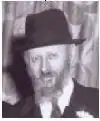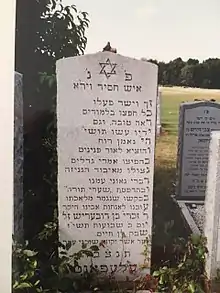


Zechariah Elefant (Yiddish: זכריהו עלעפאנט, Hebrew: זכריהו אלפנט, Hungarian: Elefánt Zoltan, English: Sol Elefant; February 11, 1886, Kárász, Hungary - June 1957, New York City) was a rabbi, author, publisher, and book salesman.
Biography
Elefant was born in the town of Nyírkarász, Hungary. His father was Rabbi Dov Berish Elefant, and his mother was named Bava (née Eisenberger). As a young man he studied at the Yeshiva of Sighet and the Pressburg Yeshiva.
A few years before the World War I, he married Sarah (née Kahane), a Polish citizen. In 1923, he emigrated to New York with his wife and three children.
In New York, he served as rabbi of a synagogue. Later he opened a bookstore on Canal Street in Manhattan's Lower East Side, where he sold "rare manuscripts and published works"[1] as well as Torah scrolls.[2]
In 1938 he and his father published the book "Ein Habedolach" by Rabbi Chaim Zvi Menheimer, who was his father's teacher. After the death of his father, he published another book, "Ein Habadolach on the Talmud", in 1944.
The National Library of Israel has two manuscripts with his signature from his private library.[3]

References
- ↑ Rabbi Yitzchak Glick wrote at: Binyamin Wolf Leow, Shaarei Torah, Part 4, Volume 1, Page 11: "לזכר עולם ולעי"נ הרבני הגדול בתורה מוה"ר זכרי' עלעפאנט ז"ל ובנו הרה"ח מו"ה חיים אלי' ז"ל נפט' כ"ג אייר תשל"א , אשר הצילו ושמרו על כתבי היד של רבינו, ומהם זכיתי והגיעו לרשותי" (English Translation: "In memory of the great Rabbi Zechariah Elefant z"l and his son... who saved and preserved this Rabbi's manuscripts, and from them I had the honor of receiving the manuscript of this volume (in order to print it)
- ↑ See, for example, the advertisement of "Zechariah Elefant books" in the following source: המאור, שנה ג, חוברת ו (ב) (אדר ה'תשי"ב), עמ' 29; and the following advertisement as "Publisher of books and rare manuscripts" at: המאור, שנה א, חוברת ב (ניסן ה'תש"י), עמ' 21
- ↑ See: Rav Aharon Kutna - Glossary on the Talmud" his stamp appears at page 131, as well as the following volume: Rav Aharon Kutna - Glossary on the Talmud"
External links
- Ein Habedolach 1944, preface detailing his life's story up to then (in Hebrew).
- Sources quoting Rabbi Elefant:
- Rabbi Yekutiel Yehuda Grienwald, Kol Bo on Mourning, Vol. 1, New York 1947, p. 380 (in Hebrew).[1]
- Rabbi Yekutiel Yehuda Grienwald, Kol Bo on Mourning, Vol. 2, Brooklyn 1951, p. 147 (in Hebrew).
- Dr. Yohanan Cohen-Yashar, "ספר חדש של פרופ׳ נהר על המהר״ל", Hamaayan (Tishrei 5727, 1966), Vol. 7, Issue 1, p. 78, item 74a (in Hebrew).[2]
- ↑ The following is the Hebrew language quote: "ידידי הרה"ח ר' זכריהו עלעפאנט מברוקלין כתב לי, וזה לשונו 'הנה הרבה פעמים באים אלי אנשים כדי לכתוב להם נוסח על מצבות, ועשיתי לעצמי גדר להוכיחם ולהגיד להם שאסור לחרות על האבן יום הפטירה במנין השנים שמונים נוצרים... מאד אני מתפלא על הרבנים הגאונים בפה שאין אחד מהם פוצה פה ומצפצף על הנבלה הזאת להוכיח את משפחת הנפטר ולהורות להם הדרך למחוק מהמצבה חשבון השנים...'".
- ↑ This article discusses the initial reason for writing the book "Zvi Chemmed" by Rabbi Zvi Hirsch Friedman (Brooklyn), 1956, as his discussions with Rabbi Elefant which formed the contents of this particular book: "עשרות שנות שבתו של המחבר בארה״ב, לא 'צננו' את התלהבותו ורוח הקרב שלו, בסידרת הקונטרסים שלו בשם הכללי ״צבי חמד״, מתריע מדי פעם על תקלה מסוימת, או פס״ד שלא כדעתו. הפעם יוצא בקונטרס ל״ד... הקונטרס נערך בתשובה לשאלת תלמידו זכרי׳ עלעפאנט...".